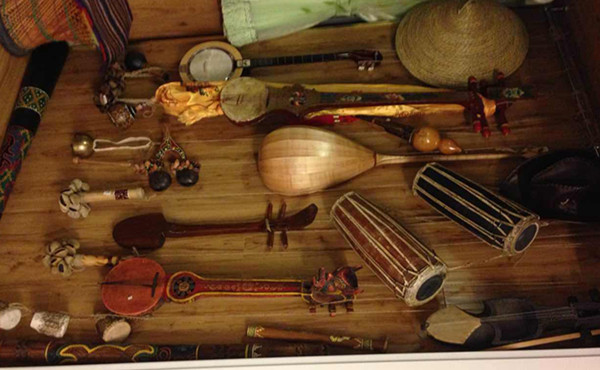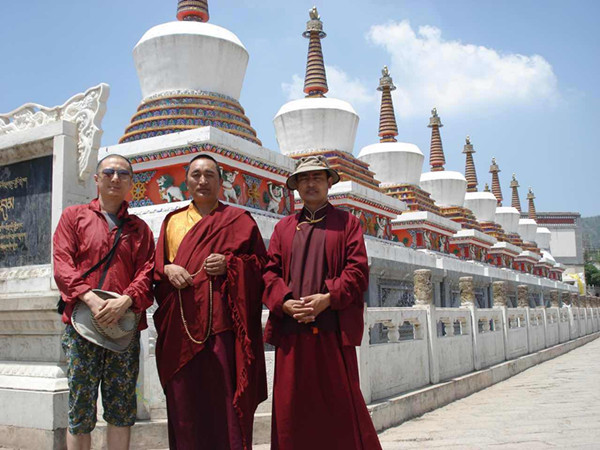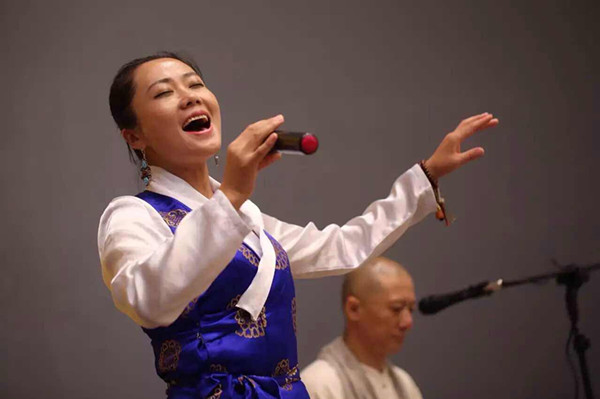
After visiting nearly 20 remote regions, Liang has collected over 100 rare musical instruments. (Photo courtesy of Liang Xu)
Beijing (ECNS) – Liang Xu, wearing a white linen shirt and striped drop-crotch pants, opened the trunk of his car and took out a round drum-like object.
He brought it into the room, sat cross-legged on a chair and started playing. The sound of the musical instrument created timbres that were soothing and rejuvenating.
"This is called Se Kong," Liang told his friends who were listening. Along with those stored at home, Liang has collected over 100 ancient Chinese musical instruments that even those born in China can't name.
After an arduous journey of 15 years to the remotest regions of the country, Liang, who has been dubbed the father of China's new age music, has developed a genre of music that carries on thousands of years of Chinese folklore, some of which is on the brink of extinction.
Born in 1968 in Shaanxi province, Liang was a rock singer in his twenties. On a visit to a village, he was glued to a melody that calmed him as a rebellious young man. Since then, Liang has been a pioneer in new age music, which had hardly been touched upon in China.
"To me, new age music is inspired by nature and builds on the essence of traditional music of all tribes and ethnic groups, and can purify people's souls and heal their wounds," Liang said. "The difference is that my music is wholly oriental."

Liang has left his footprints in nearly 20 regions at home and abroad. He lived with local people, ate with them, dressed like them and listened to their music. He then came back to Beijing to produce acoustic music that incorporates the cultures, histories, religions and natural environments of the places he visited. Sometimes he returns to the same place several times to get the right sound.
"It can be exhausting and even dangerous," Liang said, recalling the memory of his sudden faint on Mount Qomolangma. But he added that sometimes recording is the only way to show respect for cultures that are disappearing because of urbanization.
Liang told the story of an old man he met in southwest China's Guangxi province. The man is the only one who knows how to sing a kind of wizard song. In ancient China, people hired wizards to practice certain kinds of witchcraft, and the wizards usually sang a special song to ward off evil spirits. But the music is disappearing as people don't need such rituals anymore.
Liang said he's glad he recorded it.
The result is one-of-a-kind music that heals. Liang's music helps slow down breathing and heart rates, eases pain and strengthen one's immune system.
"Since ancient times, the Chinese believe that some music can be healing," Liang said. "For example, it's a belief that if one's body lacks metal, music played with metallic instruments can help to heal."

Liang is also devoted to Buddhist music. He and his team are working on an album that is quite different from its parallels. The three band members, including Dekyisto, a girl he met in Tibet, spend most of their days in Buddhist temples recording and collecting inspirational moments. Instead of using ordinary musical instruments, they play with Buddhist tools and vessels and perform a ritual before each of their performances.
The band, named Zhibei (meaning wisdom and mercy) Buddhist Music, was invited to the Milan World Expo in Italy from October 11 to 19.
Although recognition is on the rise, Liang said there's still a long way to go as few Chinese have exposure to such music.
"There's a Grammy Award for new age music," Liang said. "But in China, commercial music is winning all the way."
Even so, Liang said he will stick to new age music his whole life, as "it's the best way to really carry on traditional Chinese culture."


















































